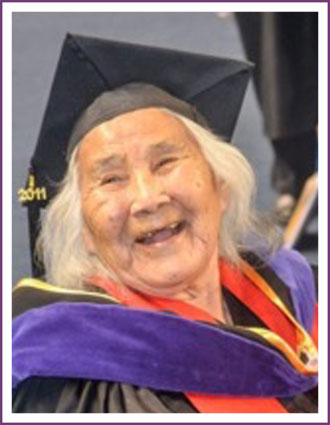KATIE (Charlie) JOHN

• Land/Resource Rights
• Cultural Leader
• Advocacy
Inducted: 2014
Deceased: 2013
KATIE (Charlie) JOHN
Katie John started life in 1915 near Slana, Alaska, and was raised in the Native village of Baltzulneta in the traditional way. Her long life, spanning 97 years, carried her from a traditional native village life to a modern western lifestyle, from travel by foot to travel by plane and from being taught traditional ways and learning traditional knowledge to being awarded an honorary doctorate of laws from the University of Alaska, Fairbanks. Subsistence is key to how John lived her life: as a child; as a parent raising 20 children with her husband; to her successful battle to have subsistence recognized as a legal right inherent in Native culture.
The “Katie John case,” litigated by the Native American Rights Fund, began in 1985 and continues to this day. By standing up for her belief that she had the legal right to live a subsistence lifestyle, John forced the federal government to protect and preserve subsistence rights on federal lands and waters and forced the State of Alaska to cede management authority to the federal government over subsistence uses of Alaska’s fish and wildlife on federal lands.
John led and taught other aspects of Ahtna Athabascan culture as well. She helped develop the first written alphabet for the Ahtna Athabascan language in the early 1970s and then recorded pronunciation guides to help teach and preserve that language. She was a tireless teacher of the language and culture to her many (more than 250) grandchildren, great grandchildren and great-great grandchildren. As a strong, resolute and persistent woman, Katie John is recognized as a respected elder, culture bearer and matriarch.
View Extended Bio